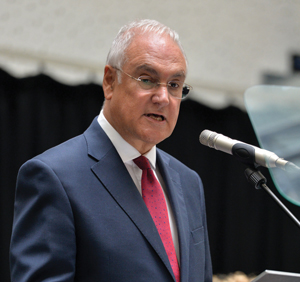Ofsted boss Sir Michael Wilshaw has challenged employers to engage more with colleges in an effort to bridge the skills gap.
The education watchdog chief inspector said businesses should consider apprenticeships as the answer to their vacancies problems.
Speaking to the Confederation of British Industry (CBI)’s East of England education conference in Cambridge on Tuesday (November 19), he said: “The economy is improving, jobs are more plentiful, and there is cross-party agreement on the need for more high-quality apprenticeships.”
But, he said: “Vocational education is still failing to deliver the needs of both young people and of society. There are currently 146,000 job vacancies that employers cannot fill because applicants don’t have the required skills.”

He further issued a series of challenges to employers, saying: “Have you made a sustained effort to engage with schools and colleges and let them know what opportunities you offer? What would it take to turn a job vacancy into an apprenticeship?”
He added: “It’s easy to bemoan the lack of qualified youngsters, but what are you doing to help solve that problem?”
Martin Doel, chief executive of the Association of Colleges, said: “Colleges already work with an average of 700 employers in their local area but they are keen to do more.
“Sir Michael is absolutely right to call for more involvement from employers and we hope to see more engagement over coming months and years.
“Employers create apprenticeships and they must be involved in their development for them to be successful.
“However, young people need to be aware of the options open to them. Only a step change in the careers advice available to them will lead to more becoming apprentices.
“That’s why our Careers Guidance Guaranteed campaign calls for the establishment of careers hubs in every local area involving schools, colleges, local councils and others.”
Sir Michael said “a fundamental shift” in educational structures was needed, praising schools and colleges who had come together in “clusters”. “That trend to federation should be encouraged,” he said.
At least one school in a cluster should offer vocational provision to 14-year-olds, such as a specialist college or University Technical College, he said.
“Young people could then transfer across institutions in the cluster to provide a route to high-level academic or vocational study,” he said. This would mean they “would not be stuck in one route”.
Sir Michael said the UK had “been stuck on the same policy roundabout year after year without any clear idea of which direction to take”.
To solve this, he laid out a number of steps to transform vocational education, and to help it match up to schemes abroad.

“Apprenticeships must have parity of esteem with A-levels,” he said.
“They must be sold aggressively to schools, parents and young people.”
Vocational education “should be seen as a valid option for every student and not as the consolation prize for those who cannot do anything else,” he added.
He also said vocational training must give a clear line of sight to work and employer engagement should be at the forefront of any reform.
Neil Carberry, CBI director for employment and skills policy, said: “Businesses support schools and colleges in many different ways, but can do more. We know that the more interactions young people have with the workplace, the better prepared they are for life outside school and college.
“We want all businesses to increase their engagement with schools, but this cannot just be laid at the door of firms alone. The government must do more and start by reintroducing work experience for Years 10 and 11.”








Could be a good time for locally competitive colleges to simplify and bring coherence to dialogue with business through B2B unification – retain individual organisational delivery expertise but collaborate through market intelligence, marketing (to business) and engagement.